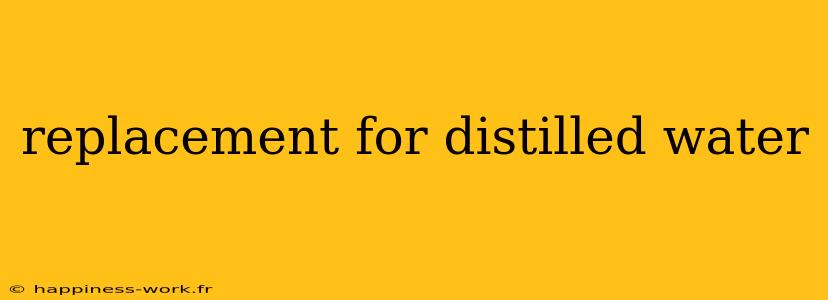Distilled water is often touted as the purest form of water available, having undergone a rigorous distillation process that removes impurities, minerals, and contaminants. However, there are instances where distilled water may not be readily available or where users might be looking for alternatives. In this article, we will explore various substitutes for distilled water, their practical applications, and how they measure up in terms of purity and safety.
What are the Uses of Distilled Water?
Before diving into alternatives, it’s essential to understand where distilled water is commonly used:
- Medical Use: In hospitals and laboratories.
- Household Appliances: Such as steam irons and humidifiers to prevent mineral build-up.
- Cooking: In recipes that require pure water for optimal taste and quality.
- Aquariums: Ensures a stable environment for fish.
Alternatives to Distilled Water
Here are some alternatives to distilled water along with their pros and cons:
1. Filtered Water
Q: Can filtered water be a substitute for distilled water?
A: Yes, filtered water can be a good substitute for distilled water, particularly if it has been filtered through reverse osmosis or a high-quality carbon filter.
-
Analysis: While filtered water does remove many impurities and chlorine, it may not eliminate all minerals, depending on the filtration system used. For instance, reverse osmosis systems can remove a significant percentage of dissolved solids.
-
Practical Example: If you use a Brita filter or a reverse osmosis system in your home, the water produced can be suitable for cooking and drinking but may not be ideal for sensitive medical equipment.
2. Spring Water
Q: Is spring water a viable alternative to distilled water?
A: Spring water can be an alternative, but it’s important to ensure that it comes from a reputable source.
-
Analysis: Spring water contains naturally occurring minerals, which may not be suitable for all uses. For instance, it might not be ideal for an aquarium where balanced mineral levels are crucial.
-
Practical Example: If you’re using spring water for cooking or drinking, it will likely taste better than distilled water, but be cautious in applications requiring mineral-free water.
3. Bottled Water
Q: Can bottled water work in place of distilled water?
A: Bottled water is generally treated but may not be the best substitute for distilled water.
-
Analysis: The quality of bottled water can vary significantly between brands. Some may include minerals and impurities that could affect sensitive applications.
-
Practical Example: Bottled water may be appropriate for daily hydration but should be avoided for filling steam irons or in recipes that require absolute purity.
4. Tap Water (with caution)
Q: Can I use tap water instead of distilled water?
A: Tap water can sometimes be used as a substitute, but this depends on the local water quality.
-
Analysis: Tap water often contains chlorine, fluoride, and other minerals that may not be desirable for certain applications.
-
Practical Example: For household uses like watering plants or washing dishes, tap water may suffice, but for delicate tasks (like certain types of medical equipment), it's best to stick with a purer alternative.
Additional Considerations
-
Safety and Purity: Always consider what you’ll be using the water for. While alternatives can work in a pinch, they might not deliver the same level of purity as distilled water.
-
Environmental Impact: Bottled and spring water often involves plastic waste. Opting for filtered water can reduce your carbon footprint.
-
Cost: Investing in a quality filtration system can save you money in the long run compared to continuously purchasing bottled or spring water.
Conclusion
While distilled water is the gold standard for purity, there are several alternatives available that can be used effectively based on your needs. Filtered water, spring water, bottled water, and even tap water can serve as substitutes under the right circumstances. However, it's critical to understand the characteristics of each alternative to ensure they meet the necessary purity requirements for your specific applications.
For best practices, always opt for the most suitable water type based on its intended use, and when in doubt, stick with distilled water for applications where purity is paramount.
Attribution: This article references and builds upon content found on WikiHow, where experts answer various questions regarding substitutes for distilled water. For a more detailed look, you can visit WikiHow's extensive resources.
